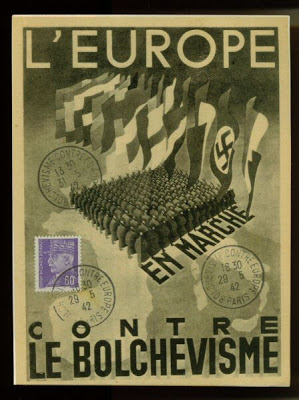We in the United States are used to the notion, promulgated even before the United States entered the Second World War, for example with the Hollywood propaganda film Casablanca (1941), that the whole French nation was dying to be liberated from German occupation. It is easy with a little research to determine that this was not exactly the case. We get a different picture in this excerpt from an interview with Professor Robert Faurisson by Phil Sanchez in Irvine, California, 22 June 2002:
Q: You once said that in France during World War II there were two Resistance movements; one against the Nazi occupation and a second one against the Communist terror. Could you, please, elaborate on the difference between the two but also go into some detail about the second?
A: In France they constantly say la résistance. They constantly talk about la résistance. Even, with time going on, they now don’t talk anymore exactly about résistants, but about grands résistants. It’s always a grande résistance. All those people are supposed to have been grands résistants.
And this is partly a joke of mine. I ask: “Oh, you say Resistance! What do you mean by Resistance?” And the people answer: “Of course, resistance against Germany” And I say: “Okay, I see, but you know, there was another resistance. The people on the other side from yours were convinced that they were also resistants. But resistants against Communism, against Communist terror in France.”
It began in June 1941 and went until at least the Bloody Summer of 1944. You cannot imagine, today, the power at that time of the French Communist party, and how many people it killed because those “collaborators” were, or were supposedly, on the side of the Germans. You had very sincere French people on the side of the Germans. They were not in love with Adolf Hitler or even with the German people. They thought that the big danger for Europe and for France were Communists coming with the Red Army. They wondered where the Red Army would stop. That was their question.
In June 1942, Pierre Laval, who was a kind of prime minister, with Marshall Pétain, said: “I hope that Germany will win”. I guarantee you that Pierre Laval was not at all in love with the Germans. He added: “because, otherwise, we will have Communism all over Europe.”
So, I warn you to be careful with this word of Resistance since, you see, most of the time people think of themselves as courageous, which is not really the case. Most people are cowards. But they think that they are courageous. They are courageous because they resist something. During the war, you had those people resisting the German occupation, but you also had people resisting the Communists who were assassinating so many French people at that time.
Q: Were there trials for these murders?
A: Of course not. As usual, if you were on the good side, you got medals, respect, money. If you were on the other side, it was exactly the opposite. That’s life. You must not be vanquished, that’s all.
Q: So, after France was no longer under German Occupation, there were no murder trials for murders that were committed by the Communists during the Occupation?
A: We had very few of them. And once those people were sentenced — very, very few of them — they were, how do you say, “pardoned”? Yes. There was an automatic amnesty, according to a decision of the government of De Gaulle. They decided that everything, — listen to this, it’s fantastic — everything which had been done “in order to liberate France” until the First of January 1946 should be pardoned — do you understand? Nineteen forty-six. The war, remember, had ended on the 8th of May 1945, and the last town in France was liberated in December 1944. The simple fact that we had an amnesty for everything which had been done (laughter) during, let’s say, the whole of 1945, means that they kept on killing people.
Q: Reprisals?
A: Reprisals. Yes.
Q: I don’t know if this is a question that you can answer, but it was a particularly French Communist group or were they just a Soviet puppet group?
A: No, a real and sincere Communism.
Q: They did not want to be a puppet of the Soviet Union? They were French Communists?
A: Absolute puppets, but I would say sincere puppets.
